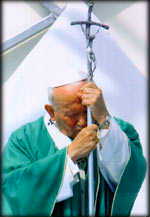The Suffering Servant

"The pope should retire. He's too old and frail," he says.
"His mind is still there," she replies.
"Bah. He should step down, for the sake of the Church. What's the point in going on like that?"
Many people say John Paul II should not continue his papacy. Everyone sees the difficulty he has. He walks in slow, shuffled steps. He battles fatigue. He raises a trembling hand to the people, and speaks with slurred speech. Parkinson's, arthritis, and other ailments have hit him hard, though there is no indication that the pope's mind has weakened.
When you ask someone why the pope should retire they'll probably say, "He needs to step aside so that the important work of the papacy can get done."
But the pope's important work is being done. John Paul II continues as Holy Father to the Catholic world, exhorting and encouraging, teaching and guiding. He continues as Pontiff, or bridge builder, fostering unity with those both within and outside of the visible Church. I believe many people want the pope to retire not because they've seen a decline in his effectiveness, but because they dislike seeing him suffer before their eyes.
"The Pope would see the present time as afraid of suffering," says Monsignor Lorenzo Albacete, a personal friend of the Pope. "The way the modern age sees suffering--it is a problem to be solved. And when it is unable to solve the problem, it will just set it aside or try to make it invisible. Therefore you have the invisibility of so many suffering.
Mons. Albacete was interviewed by the PBS television show Frontline for a 1999 documentary on John Paul II. The pope believes it is very important that he not hide his suffering, like a candle's light under a bushel basket.
"[The Pope had his appendix removed in October of 1996. After the operation, he lets the cameras] right into his bedroom where he looks right at the camera looking not so happy, surrounded by tubes. At night, after about the second or third day--I know, a friend of mine was a doctor on the floor where he was--he would get up to visit the other rooms there. But he has invited the media and the press because he wants to be seen suffering. He has to use a wheelchair. He'll come out with it and have himself taken down by crane from the 747, greeting people everywhere, because we should not be ashamed or hide anything of pain and suffering and illness. This is where our humanity shows."
"In the end, he believes that life comes from sharing in the sufferings of Christ on the cross. So, suffering to him is not the ultimate challenge to faith, but the crucible where real faith is born. ... Therefore suffering becomes the crucible where one's humanity emerges in its greatness, in the ability to overcome suffering with hope and joy, and serenity and hope above all. ... For him, how human beings suffer is a crucial reality to present. Once again, he has written about it. He has written plays about it, he has written poetry about it, he has written encyclicals about it. In the end though, he must suffer publicly, and he is convinced of this."
Together with the pope, I see the importance of his suffering before the world, especially for those of us in the West. Here, where the sick, suffering, old, and non-beautiful are not found on the cable channels; where the sick are hidden in hospitals and the old are stored in nursing homes; where the baby boom generation will soon have to confront sickness and old age themselves. How they receive it will shape industrialized societies around the world. We need the pope's example, for it is the example of Christ.
I am moved by seeing John Paul, a suffering servant of the Lord. I see Providence in what he endures. The pope certainly recognizes it too and embraces it as his cross, for God's glory and our good. "And the Lord was pleased to bruise him in infirmity" (Isaiah 53:10) Through his struggle he is a model for the watching world.
In the past, the pope spoke out against euthanasia's claim that the sick and old are deprived of their dignity. Human dignity comes from our Creator, he said, and can never be lost. Now, sick and old himself, he is living that dignity out. Today the pope speaks in defense of the unborn, opposing stem-cell research, as one who could allegedly benefit from it himself. The pope speaks of the value and purpose of human suffering as one who suffers, and it is inspiring to see and hear.
Often the way God does things is not the way we would think best, but it is for the best. I believe Pope John Paul II is a man of such character and holiness to know what God wants him to do and to do it. Until his time of service ends, he has my support. I for one am not going to abandon a holy man, enduring suffering, on the way to his death. That is how the suffering servant of the Lord foretold of in Isaiah was treated. The disciples abandoned Jesus, but his good work was still completed.
May the world see Christ through John Paulís journey to final victory.
|
